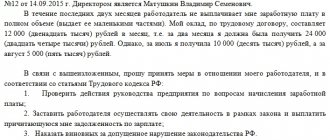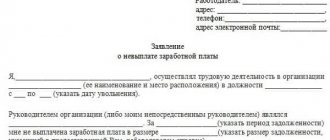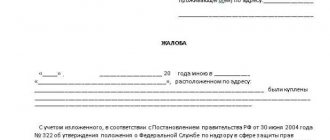Home / Labor Law
Back
Published: 10/23/2018
Reading time: 8 min
0
266
Each employee has not only certain job responsibilities, but also rights. If an employer violates current labor laws, the employee has the right to contact supervisory authorities to complain about the violation of his rights.
- What is a violation of labor laws
- Where to complain about violation of labor laws
- How to properly file a complaint
- How to file a complaint and the time frame for its consideration
How to properly draw up and submit a complaint to the prosecutor's office
The procedure for completing the application and its delivery depends on the type of complaint against the employer and the addressee. None of the possible recipients have unified state forms. Nevertheless, some rules regarding their content are reflected in various legislative acts. In any case, all statements have a standardized structure consisting of several information blocks.
Regarding the question of how to file a complaint, this procedure also has some regulations. If we are talking about personal delivery of a written complaint against the employer to the prosecutor's office or another addressee, then the latter must put a mark of receipt on its copy. When sending a complaint via the Internet, it is registered with an unconditional assignment of an individual number.
Further, the applicant has the right to clarify the further progress of the consideration of the complaint against the employer and write petitions for early termination of work on it (it is allowed to withdraw the complaint from the prosecutor’s office before the start of the proceedings). If the addressee is incorrectly identified, the letter will be read and forwarded as part of interdepartmental interaction (of which the applicant will be warned).
Claim to a judicial authority
If you go to court, a statement of claim is drawn up, and not a complaint, as was the case in previous cases. There is no need to try to solve the problem through other authorities before going to court.
This condition may not be met. Although it is known from practice that most often the court is the authority where people go as a last resort. For example, if an employee was fired illegally, he immediately files a claim with a judicial authority.
Why is it sometimes better to go straight to court? The fact is that in this case, it is the violation referred to in the lawsuit that is being checked, and not the entire activity of the enterprise.
According to the court decision, if it is in favor of the plaintiff, it will be a matter of not only punishing the perpetrator, but also of certain actions in favor of the applicant (for example, reinstatement, compensation for forced absences from work, payment of compensation for moral damage, etc.).
Negative nuances of solving the problem through the court - the case takes a long time to be considered, and you have to pay a state fee.
The statement of claim consists of several parts. The “hat” is designed first. The sample can be taken from any application to the court.
When is it necessary to file a complaint?
The relationship between the employer and staff members is based on the Labor Code, which implies the rights and obligations of both. If an employee’s rights are violated, he actually has the right to complain against the employer to the State Labor Inspectorate or to the court or prosecutor’s office. In this case, it does not matter whether a person is working or has already been dismissed from the organization if there are facts of an offense.
As for the issue of limitation of actions. If a person wants to complain to a court, then it is approved in Art. 392 Labor Code of the Russian Federation. Complaining about a labor dispute with an employer is allowed within three months after the discovery of an offense against you. Disputes about unlawful termination of a contract by the employer can be appealed within one month after signing the dismissal order.
There are no legal delays for filing a complaint for prosecutors and inspectors. The only obstacle to filing a complaint against an employer with the prosecutor's office and inspection in all cases is the liquidation of the organization as such. Therefore, it is worthwhile to implement the decision to complain against the employer in a timely manner. And do this not in anonymous mode.
Application to GIT
In order to monitor employers' compliance with labor legislation, the State Labor Inspectorate (SIT) was created. It considers complaints made by one person, a group of employees or the entire workforce. In this case, the procedure does not change.
The complaint must be made in writing. You can hand it over in person to the regional inspection office or send it by mail.
There is no single requirement for drawing up a claim, that is, the document is drawn up in free form. The main condition is to indicate these parties to the conflict.
A correctly drafted claim shall indicate:
- personal data of the applicant: full name, address, email, telephone;
- employer data: company name, actual and legal. address;
- descriptive part of the complaint;
- date of compilation, signature.
Please note! Anonymous complaints will not be considered. At the request of the applicant, his data is not disclosed to the employer.
In this way, the employee can be protected from further “harassment.”
Based on the facts stated in the complaint, an inspector conducts an extraordinary inspection. Violations of labor laws or other regulations may subject the company and its management to fines.
The employer will receive an order to eliminate the detected deficiencies within a specified period. After a certain time there will be another check, based on the results of fulfilling the order. Based on the results of the inspection, the applicant will receive a written response within one month.
Watch the video. Advice from a lawyer on labor disputes:
What you need to know about the prosecutor's office and the State Labor Inspectorate

The Prosecutor's Office and the Federal Inspectorate are centralized entities with main offices in Moscow and a system of territorial bodies subordinate to them (located in different constituent entities of the Russian Federation). At the same time, they are guided by different legislative frameworks. The prosecutor's office guards the law and constitutional rights in general, and the inspectorate is guided by the Labor Code.
Both of these organizations investigate complaints received from people (if they are not anonymous) and have the right to initiate an unscheduled inspection of the activities of the employer’s enterprise (except for the planned schedule). In carrying out its functions, the prosecutor's office is subject to Federal Law No. 2202-1, and the inspection is subject to government decree No. 875 and a separate article in the Labor Code of the Russian Federation No. 356.
Is it possible to complain anonymously?
It was already mentioned above that anonymous requests are not accepted. If you want your complaint to be reviewed and appropriate action taken, please ask the authorities to whom the complaint is being sent not to disclose your personal information.
Remember! This right of citizens is specified in Art. 358 Labor Code. The request for confidentiality must be made in writing and submitted along with the complaint.
The document is drawn up in free form. You should list the reasons why you do not want the data to be disclosed. You can also ask the inspector involved in your case about this.
Nuances of competence and formality
Since the prosecutor's office has a higher supervisory status than the labor inspectorate, the state provides it with a more extensive list of punitive powers against offenders. You can contact the prosecutor's office with an initial complaint against the employer or complain here about a previously made decision of another government agency (for example, the same Labor Inspectorate) or its inaction.
Measures to respond to identified violations following a complaint to the prosecutor’s office against the employer’s actions:
- performance;
- protest;
- resolution to open a case on an administrative violation;
- resolution to identify criminal facts in the materials of the case;
- warning;
- claims to the court.
The Labor Inspectorate's assessment of the problematic situation that has occurred with the employer is carried out by requesting papers and visiting the site. The results are sent for further investigation to the Department of Labor and Social Protection. After all the examinations have been carried out, the employer is issued an order regarding violations, which he must eliminate within a certain time frame.
The order may be accompanied by a fine for an already identified violation that the employee has complained about. The amount of the employer's fine is determined based on the type of violation under the Labor Code of the Russian Federation. A fine issued in the name of an enterprise can be several dozen times higher than the sanctions applied to individual officials.
A distinctive feature of the functionality of the territorial bodies of the State Labor Inspectorate after investigations is the publication of information on employers who guarantee compliance with the rights of their state, as well as employers who are unscrupulous in this matter. These registers are publicly available on the website.
Complaint to the Federal Tax Service
If violations of your rights by the management of the enterprise are related to finances, then it is better to write a statement to the tax office.
Typically, such an appeal is made when:
- employees receive unpaid wages;
- there are salary arrears;
- a person is admitted without official registration (as required by the Labor Code of the Russian Federation);
- fines are withheld from the employee without any reason (contrary to the terms of the employment agreement).
The complaint must be made in writing. Although there is no standard form, certain patterns are used.
An appeal to the tax office consists of the following points:
- name of the Federal Tax Service department to which the application is sent, details and full address;
- information about the applicant: full name, address of actual place of residence;
- telephone number, email address, other contacts;
- what position the applicant holds;
- period of work in the company (date of registration and date of dismissal (if the applicant no longer works at the company));
- what violations were committed;
- list of put forward requirements;
- what are these requirements based on?
- a list of additional documentation that is submitted along with the complaint;
- applicant's signature with transcript;
- date of filing the complaint.
The statement of the essence of the problem must be complete and specific, listing the facts of violation of worker rights and labor legislation, as well as with a request to verify these facts.
Based on the complaint, an inspection is carried out, and based on its results, if violations are proven, the violator is brought to justice. responsibility. He will have to pay a fine.
Important! The complaint is reviewed within 30 days (maximum).
Methods and procedure for sending complaints

In both cases, you can complain in the standard way - hand over a copy you wrote yourself to specialists. On the Internet there are many common examples of complaints against an employer to the prosecutor’s office and other authorities. As an option, it is also possible to file a complaint against the employer on the spot using the samples available here.
An alternative is an online complaint on the official portal of the prosecutor’s office and on the website of the Federal Service for Labor and Employment (also subject to the refusal of the anonymous regime). There is no difference in the analysis of a received written or electronic application. The difference in the second case is the response exclusively in electronic format to the specified email address.
How to complain about an employer. Filing a complaint based on the number of victims:
- A collective complaint against an employer from a group of employed persons.
- Individual complaint against an employer from one employee
To facilitate the work of specialists, the State Labor Inspectorate has a categorization of problems that arise among the population. When you select the desired category and subcategory, a form is displayed with which you can complain about the employer in a non-anonymous format. Its only drawback is the need to register on the State Services Portal (USIA).
The Internet reception of territorial prosecutor's offices is developed in each subject independently (unlike the labor inspectorate, which has a website centralized throughout Russia). To make a complaint here, you need to find the online form that is current in your region. Before filing a complaint with the prosecutor's office against the employer, you will have to indicate your agreement with the rules of Federal Law No. 59 in order to study it.
Contents of the statement
You should remember one of the most important points when filing appeals to government agencies: an anonymous complaint to the prosecutor's office or inspectorate against an employer will not be accepted for evaluation. An anonymous request is obviously considered invalid. Moreover, it is impossible to answer. Therefore, Federal Law No. 59 provides for refusal to consider complaints sent anonymously.
How to write a complaint. Items required in the application form:
- A header indicating the name of the addressee (or a specific official considering complaints), as well as the full name and contact information of the applicant (since an anonymous request will remain without progress).
- The title in the middle of the sheet is “Application”.
- A text containing the issue that the person decided to complain about. It also includes references to legislative acts in favor of the applicant.
- A petition that can be stated in a list.
- A list of additional materials proving the applicant’s point of view (this item is additional and not mandatory for complaints to the prosecutor’s office or state inspectorate).
If a user decides to complain online, he avoids these formalities. All he needs to do is fill in the fields specified in the system. Again, depending on the place of application, as well as the level of this body (Federal or territorial), online forms differ in complexity and number of points.
complaints to the prosecutor's office against the employer
complaints to the labor inspectorate
Complaint to the State Labor Inspectorate regarding non-payment of compensation upon dismissal
Appeal to the Prosecutor's Office

A complaint to the Prosecutor's Office is drawn up according to the same plan as an appeal to the Labor Inspectorate.
The document contains the following information:
- name of the department of the Prosecutor's Office;
- Full name, position of the person to whom the applicant is applying;
- personal data of the applicant;
- information about place of work and position;
- data on violations committed by management, references to legal norms;
- statement of the request - to conduct an inspection, correct the violations;
- response received from the inspection (if any);
- date of compilation, signature.
The appeal is sent to the prosecutor at the Prosecutor's Office at the place of the company's legal address. There are several ways to transfer a document: transfer it to the secretary or personally into the hands of the prosecutor, through a representative, send it by mail, send it to the official website of the Prosecutor General’s Office.
Remember! The complaint is reviewed within 30 days. When it comes to illegal dismissal, the review period is extended to 90 days.
If there are no particular difficulties in considering it, you can receive an answer within 15 days.
Conducting a prosecutorial audit may have the following consequences:
- management will be forced to eliminate the violations;
- the offender will be brought to the admin. responsibility;
- persons who violate workers' rights will be removed from their positions;
- individual divisions or the company as a whole will temporarily cease operations;
- the case materials will be transferred to law enforcement agencies in order to bring the employer to criminal liability.
Required documents

When applying via the Internet or during a personal visit, you must have documents confirming your identity with you (an anonymous visit or application is unacceptable). The whole list varies depending on the addressee to whom the applicant decided to complain and the status of the latter: an individual or a legal entity. For example, the latter may be required to present a TIN.
Otherwise, citizens do not have the obligation to collect an extensive documentary package in order to complain about an employer. Often an individual can do this only with a passport. Nevertheless, to confirm the fact of an offense, everyone has the right to attach evidentiary materials to a written or online complaint.
How to compose
Depending on where the applicant wants to submit his appeal, this can be done either orally (for example, via a 24-hour helpline) or in writing. In addition, some institutions or government organizations provide the opportunity to complain about the actions of third parties online, if such functionality has been developed on their websites and this does not contradict the requirements of the law.
Special attention should be paid to the text of the document. Despite the fact that it is submitted anonymously, when compiling it, it is better to adhere to a business style of presentation, clearly describe the facts and avoid emotional and meaningless digressions. If the text of the complaint does not look convincing or contains too little initial data, this may interfere with taking urgent measures or bringing violators to administrative (or criminal) liability.
The text of the document should describe the current situation, indicate the circumstances of what happened (for example, the date and place of the incident), as well as the details of the persons who were direct participants in the conflict.
If possible, additional materials (video recordings, photographs, conclusions, etc.) should be attached to the document, which will indicate the existence of grounds for filing a complaint. And although, on the one hand, it is better not to provide the originals of materials in order to eliminate the possibility of their loss, on the other hand, not all copies can be accepted for consideration, since there may be a suspicion of their falsification. In any case, you should make an inventory of the attached materials, placing it as a separate paragraph in the document.
An anonymous complaint is not signed by the originator or he or she may provide a fictitious name. But after the text it is better to write the date the document was compiled.
What is regulation?
The concept of normative consolidation refers to the so-called principles of law - its ideological message or essence. One of the significant legal principles is justice. Consolidation in legislation is carried out when they are indicated in the texts of regulations (direct consolidation). They can also follow from the content of the law as a semantic load.
Dry application of the text of the law outside the principles of law (without taking into account their normative consolidation or the absence thereof) actually leads to lawlessness and legal nihilism. As for any complaints to various government agencies, such actions of applicants on a mass scale are capable of achieving the consolidation of the principles of law when adjusting laws by the government apparatus.
Terms of consideration

The Prosecutor's Office and the State Inspectorate are subject to Federal Law No. 59 when accepting complaints from the public. After registering a complaint, the period for consideration and formulation of a response is considered to be a 30-day delay. It can be extended on various grounds. For example, if a longer and more detailed analysis of the situation about which a particular citizen has complained is necessary (the request cannot be anonymous).
In addition, when sending a complaint to the Federal Central Office, it can forward it to the territorial entity at the place where the offense occurred. In this case, the thirty-day delay is resumed again after the complaint is received and registered with a new addressee. Special attention should be paid to this if a person wants to complain online.
Special categories of applications
Even if there is an existing conflict situation with the employer, contacting government agencies should not necessarily be qualified as a complaint. For example, on the website of the inspectorate in question, it is possible to submit a standard request, the purpose of which is to consult specialists. It is also not anonymous, but does not require registration with the ESIA.
This service is provided after filling out an online form with the introduction of personal and contact information (the option of an anonymous request is also eliminated), as well as a statement of the alleged violation of the employee’s rights by his employer. A detailed, qualified response using current legislative acts is sent to the e-mail specified by the applicant.
In addition, it is worth distinguishing complaints according to the type of offense that occurred and the intended punishment. Thus, the interests of the applicant are resolved with the help of an order sent to the employer, or both parties will be drawn into long-term investigative and judicial processes, which may be followed by administrative punishment for the violator.









